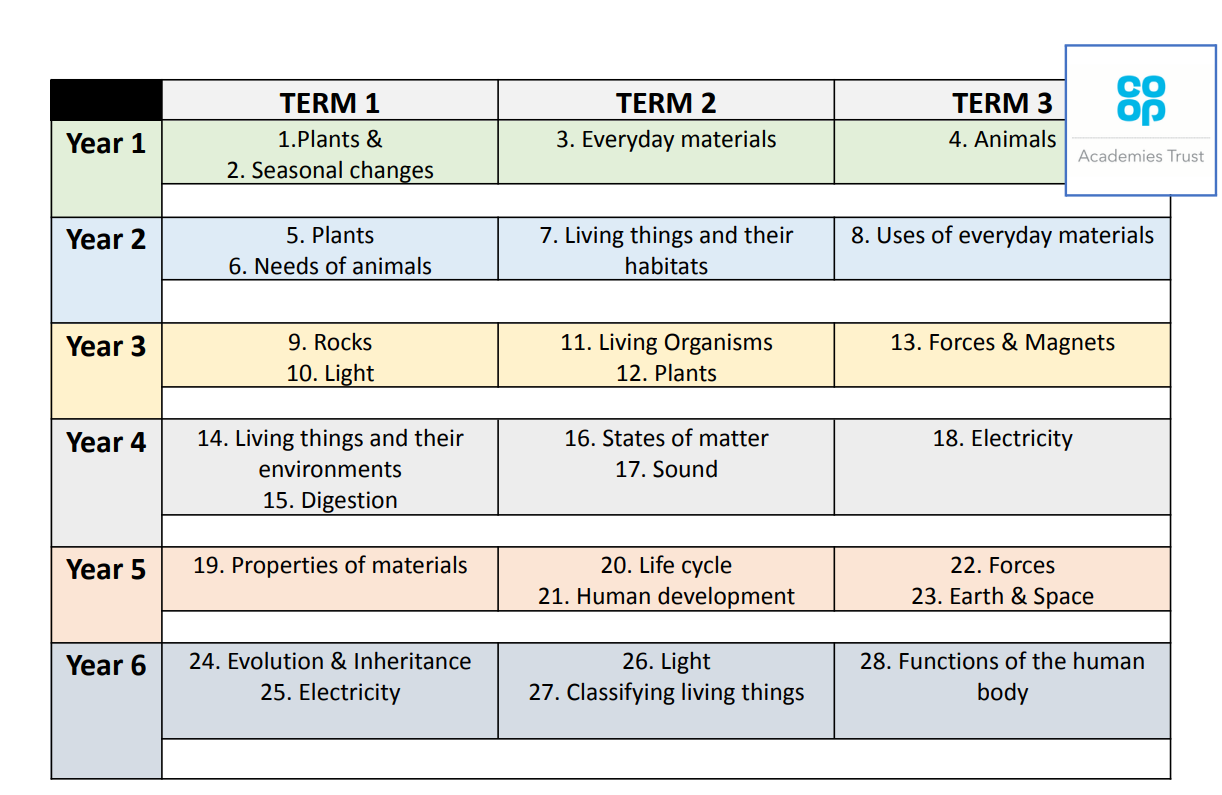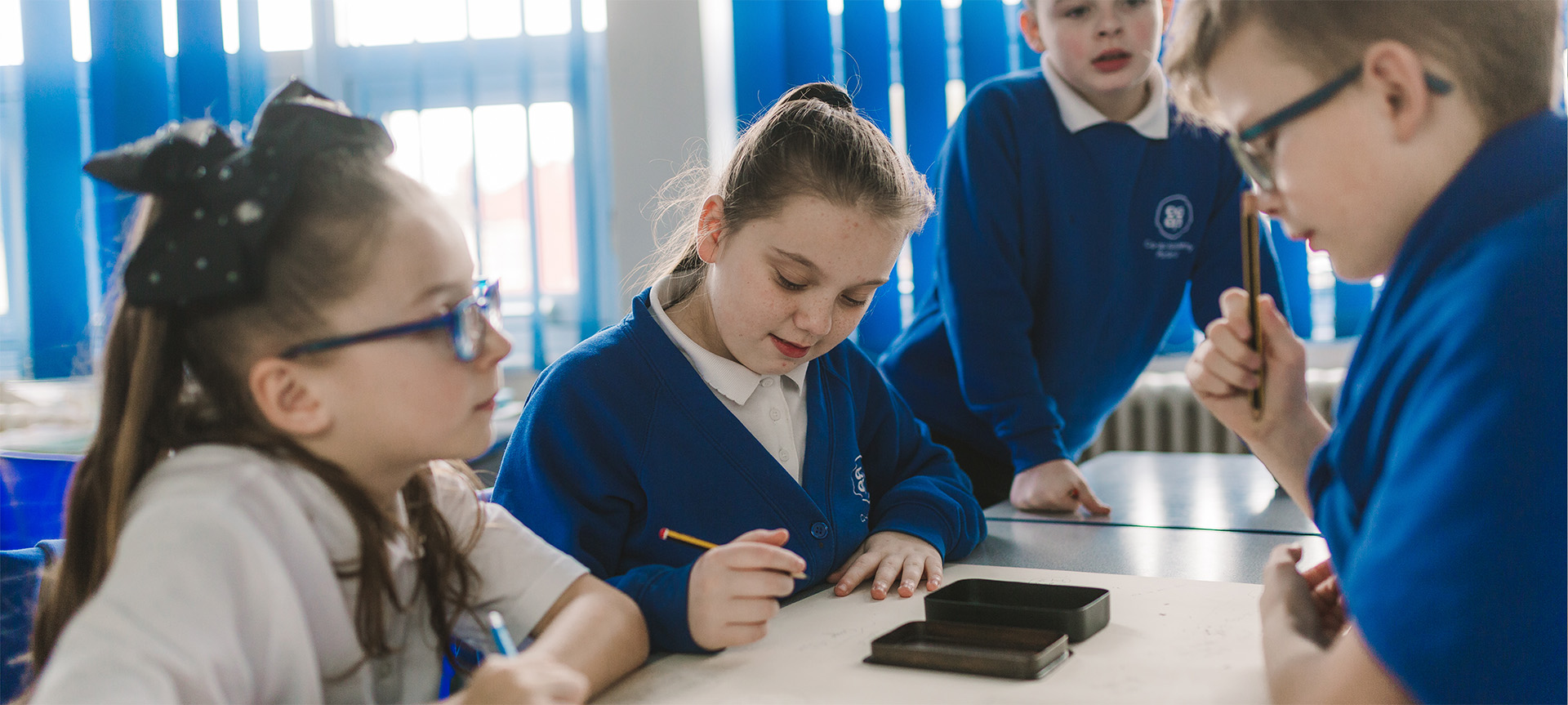Science
The 2014 National Curriculum for Science aims to ensure that all children:
-
develop scientific knowledge and conceptual understanding through the specific disciplines of biology, chemistry and physics.
-
develop an understanding of the nature, processes and methods of science through different types of science enquiries that help them to answer scientific questions about the world around them.
-
are equipped with the scientific skills required to understand the uses and implications of science, today and for the future. We understand that it is important for lessons to have a skills-based focus, and that knowledge can be taught through this.
Mr Ogilvie is the Science Lead Teacher.


Co-op Academy Trust – Primary Science
- Co-op Academy Portland provides an ambitious Science curriculum, compliant with the National Curriculum. Our lessons are taught with a real emphasis on acquiring key science subject knowledge, understanding and skills designed to ensure that pupils build on their prior learning. The National Curriculum is a progression model, and teachers plan teaching based on what has come before and what comes next.
- Our curriculum incorporates opportunities for the use of ICT/Computing, teaching of essential numeracy, curriculum enrichment and the development of Science specific and cultural capital so that our pupils acquire wider knowledge to become educated citizens.
- The highest emphasis will be placed on the acquisition of the key skills of reading, writing and oral communication with a focus on Science specific vocabulary, which will be evidenced through pupils’ work, what they hear, read and say during classroom teaching, learning, questioning & discussion.
- We use assessment to check if our curriculum delivery is leading to retention and effective application of knowledge over time.
- There will be the highest expectations for behaviour and safety whilst Working Scientifically (practical work), to develop investigative skills. All whilst having a Coop values based and inclusive approach.
At Co-op Academy Portland, we encourage children to be inquisitive throughout their time at the school and beyond. The Science curriculum fosters a healthy curiosity in children about our universe and promotes respect for the living and non-living. We believe science encompasses the acquisition of knowledge, concepts, skills and positive attitudes. Throughout the programmes of study, the children will acquire and develop the key knowledge that has been identified within each unit and across each year group, as well as the application of scientific skills. We ensure that the Working Scientifically skills are built-on and developed throughout children’s time at the school so that they can apply their knowledge of science when using equipment, conducting experiments, building arguments and explaining concepts confidently and continue to ask questions and be curious about their surroundings.
Implementation
Teachers create a positive attitude to science learning within their classrooms and reinforce an expectation that all children are capable of achieving high standards in science. Our whole school approach to the teaching and learning of science involves the following;
- Science will be taught in planned and arranged topic blocks by the class teacher, to have a project-based approach. This is a strategy to enable the achievement of a greater depth of knowledge.
- Through our planning, we involve problem-solving opportunities that allow children to find out for themselves. Children are encouraged to ask their own questions and be given opportunities to use their scientific skills and research to discover the answers. This curiosity is celebrated within the classroom. Planning involves teachers creating engaging lessons, often involving high-quality resources to aid understanding of conceptual knowledge. Teachers use precise questioning in class to test conceptual knowledge and skills, and assess children regularly to identify those children with gaps in learning, so that all children keep up.
- We build upon the learning and skill development of previous years. As the children’s knowledge and understanding increases, and they become more proficient in selecting, using scientific equipment, collating and interpreting results, they become increasingly confident in their growing ability to come to conclusions based on real evidence.
- Working scientifically, skills are embedded into lessons to ensure these skills are being developed throughout the children’s school career and new vocabulary and challenging concepts are introduced through direct teaching. This has been developed through the years, in-keeping with the topics.
- Teachers demonstrate how to use scientific equipment, and the various scientific skills in order to embed scientific understanding. Teachers find opportunities to develop children’s understanding of their surroundings by accessing outdoor learning and workshops with experts.
- Children are offered a wide range of extracurricular activities, visits, trips and visitors to complement and broaden the curriculum. These are purposeful and linked with the knowledge being taught in class,e.g. Visits to the Science Museum, Liverpool University, Farm, Chester Zoo, Imagine That! and local high Schools.
- Regular events, such as Science Week, allow all pupils to come off-timetable, to provide broader provision and the acquisition and application of knowledge and skills. These events often involve families and the wider community.
- In the Early Years Foundation Stage, activities are planned in relation to the “Understanding the World” area of the foundation stage curriculum. Children’s progress and achievements are assessed by the Early Learning Goals at the end of reception. The activities are planned in a cross-curricular way through topic areas that are interesting and enjoyable.
During Key Stages 1 and 2, science is taught through cross-curricular topics and also specific subject lessons. Wherever possible, links are made between science and other subjects, particularly English, maths, DT and computing. Activities are planned to cover the relevant key science skills and knowledge for each year group, with particular importance placed on children working practically so that they can make discoveries for themselves. Work is recorded in a variety of ways, including the use of drawings, charts, graphs and photographs. Children complete at least 1 science investigation per term, with an emphasis on assessing particular science investigational skills. By Upper Key Stage 2, children are able to plan, carry out and then write up their full investigations. They communicate conclusions and carry out repeated tests to check the results.
Impact
The successful approach at Co-op Academy Portland results in a fun, engaging, high-quality science education that provides children with the foundations and knowledge for understanding the world.
Our engagement with the local environment ensures that children learn through varied and first-hand experiences of the world around them. Frequent, continuous and progressive learning outside the classroom is embedded throughout the science curriculum. Through various workshops, trips and interactions with experts and local charities, children have the understanding that science has changed our lives and that it is vital to the world’s future prosperity.
Our Career Related Learning enables our children to learn about the endless possibilities for careers in science, as a result of our community links and connection with national agencies such as the STEM association, Professor Fluffy (Engineering) Links with local Universities, ensuring that children have access to positive role models within the field of science from the immediate and wider local community.
During our most recent Science Week 2024, our children participated in learning about all aspects of farm life. Learning how animals were reared, fed, how crops were grown and so much more. They identified that working on a farm is multi-skilled and were surprised to learn about the many different job roles needed to run a farm successfully and safely.
Our children are also exposed to a range of different Architecture Workshops where scientists from various backgrounds work together to plan and deliver fun, educational and engaging workshops.
We want our children to feel that they are scientists and capable of achieving great things. Children at Co-op Academy Portland enjoy science and this results in motivated learners with scientific understanding.
Mr Ogilvie is our Science subject lead.
